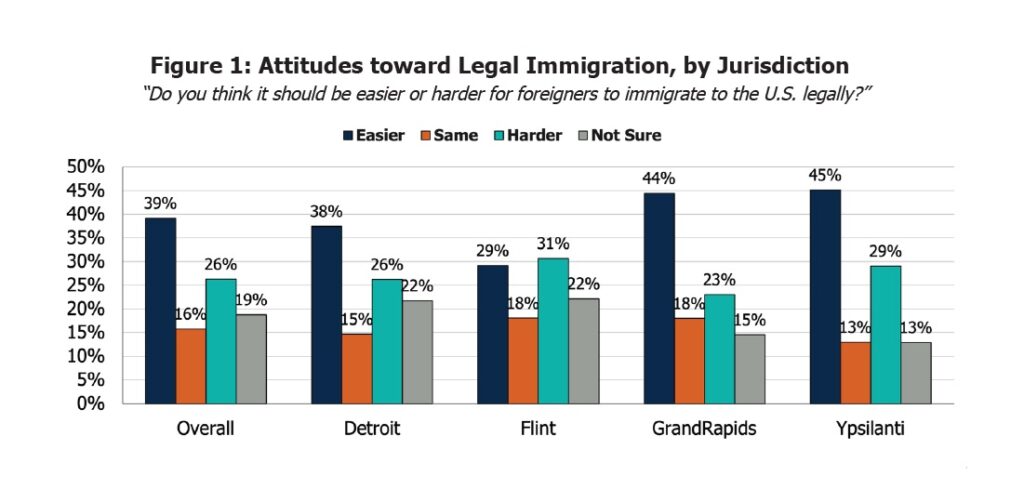» Michigan’s metropolitan areas are divided in their views on legal immigration, a UM poll shows

Contact: Lauren Slagter, [email protected]
National opinion polls consistently cite immigration as the most important issue facing the United States, yet little information is available to understand Michigan residents’ attitudes toward immigration.
Michigan is expected to be one of the most influential states in the presidential election in November, so the University of Michigan’s Detroit Metro Area Communities Study and Michigan Metro Area Communities Study surveyed residents across the state about their attitudes toward immigration.
Overall, residents of Detroit, Flint, Grand Rapids and Ypsilanti were divided on legal immigration. In the four metropolitan areas:
- 39% of residents said it should be easier for foreigners to immigrate legally to the United States
- 16% said immigration policy should remain unchanged,
- 26% said it should be more difficult for foreigners to immigrate legally to the United States
- 19% were not sure

Residents of Ypsilanti (45%) and Grand Rapids (44%) were more likely to support making legal immigration easier than residents of Detroit (37%) and Flint (29%). At the other end of the spectrum, 31% of Flint residents, 29% of Ypsilanti residents, 26% of Detroit residents and 23% of Grand Rapids residents said it should be harder for foreigners to immigrate to the United States legally.
“The entire state of Michigan is considered a border region due to its proximity to Canada, and immigration is a factor influencing the efforts of elected officials and community leaders to revitalize the local economy. By understanding how Michigan residents feel about immigration, we can influence future policy discussions,” said Yucheng Fan, data manager at the Detroit Metro Area Communities Study.
A new report titled “How Michiganders Think About Immigration” examines trends in attitudes toward immigration based on people’s education levels and their proximity to foreign-born residents. The work was supported by the Knight Foundation, the Ballmer Group, the Kresge Foundation, UM’s Poverty Solutions and Michigan CEAL.
Overall, 55% of residents with bachelor’s degrees in Detroit, Flint, Grand Rapids and Ypsilanti supported making it easier for foreigners to legally immigrate to the United States, compared to just 34% of residents in these cities without bachelor’s degrees. Residents without bachelor’s degrees (29%) were more likely to say it should be harder for foreigners to legally immigrate to the United States than residents with bachelor’s degrees (18%).
However, residents of these cities without a bachelor’s degree (21%) were also more likely than residents with a bachelor’s degree (12%) to say they were unsure about U.S. immigration policy. Residents with and without a college degree were equally likely to say immigration policy should remain unchanged.
“The surveys also found that U.S.-born residents of neighborhoods with more immigrants tend to have more positive attitudes toward immigration. This is consistent with previous research and shows that people who are likely to have longer contact with immigrants have more positive attitudes toward immigration,” said Mara Ostfeld, a senior lecturer in the Detroit Metro Area Communities Study.
On average, for every ten percentage points increase in the share of foreign-born residents in a census tract, the level of support for making it easier for immigrants to enter the country legally increases by about three percentage points.



